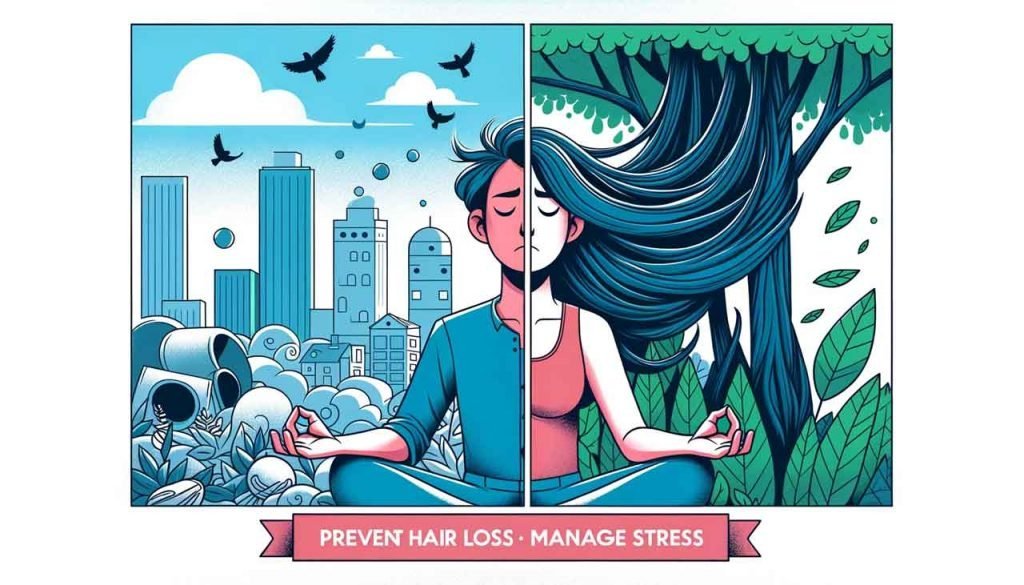Ever felt like stress was pulling the strings, especially when you found more hair on your comb than on your head? You're not the only one. But here's the twist: what if I told you that the story of "How to Prevent Stress-Induced Hair Fall" could be less about losing and more about winning? Instead of feeling helpless, imagine having the keys to a treasure chest of stress-busting, hair-boosting secrets. Intrigued? Consider this your map to rediscover those luscious locks. So, ready to join hands and turn the tide? Dive in, and let's start this transformative journey! 🌟
Table of Contents

Understanding Stress-Related Hair Loss
You're often unaware that stress is the root cause of your hair loss until you understand the mechanisms behind stress-related hair loss. Stress can push hair follicles into a resting phase, making them more susceptible to shedding. This condition, known as telogen effluvium, can be quite alarming when you see clumps of hair in your brush or shower. It's essential to remember that you're not alone in this. Many people face this issue, and it's often reversible. Trichotillomania, the irresistible urge to pull out hair due to stress, and alopecia areata, where your immune system mistakenly attacks hair follicles, are also stress-related conditions. Understanding these conditions can help you feel more connected and less isolated in managing hair loss.
The Science Behind Stress and Hair Loss
Usually, you're unaware of the scientific mechanisms that link stress and hair loss, making the situation seem more alarming. But understanding the connection can help you feel less alone in your struggle. So, here's the science: Stress triggers a shift in your hair growth cycle, pushing more hairs into a 'resting' phase, eventually leading to hair shedding. This condition is known as 'Telogen Effluvium.' Stress can also intensify 'Trichotillomania,' an urge to pull out hair, and 'Alopecia Areata,' where your immune system mistakenly targets hair follicles. Remember, you're not alone in this; understanding these mechanisms is a powerful step toward managing stress and its effects on your hair.
Role of Stress Hormones in Hair Loss
While you might know that stress can impact your hair health, you may not be aware that your adrenal glands play a key role in this process by producing stress hormones. These hormones, particularly cortisol, can wreak havoc on your hair follicles, leading to hair loss. Under stress, your body pumps more cortisol, hibernating your hair follicles. This disruption can lead to a pause in hair growth, and over time, you might start noticing more hair shedding than usual. But don't worry, you're not alone in this. It's a common issue we all face, and by mastering stress management techniques, you can help control cortisol levels, encouraging your hair follicles to return to their normal growth cycle.
How Stress Leads to Gray Hair
Struggling with stress, you've likely noticed both hair loss and an increase in gray hairs. You're not alone in this: stress can accelerate the graying process. Here's how:
- When stressed, your body releases cortisol, affecting your hair follicles.
- If there is too much cortisol, your hair can enter a resting phase, causing hair loss and potentially affecting color.
- Over time, this can lead to graying hair.
- Moreover, stress can deplete your body's store of melanin – the pigment that gives your hair its color.
- As melanin levels drop, your hair may turn gray.
- The aging process can exacerbate this, but stress can speed it up!
Potential Treatments for Stress-Related Hair Loss
After understanding how stress can lead to hair loss and graying hair, let's explore the potential treatments that can help you combat stress-related hair loss. First, it's important to remember you're not alone in this journey. Many people experience hair loss due to stress, and effective strategies and treatments exist to address it.
Consider the following treatments:
| Treatment | Description |
|---|---|
| Lifestyle changes | Incorporate regular exercise, a balanced diet and sufficient sleep into your routine. |
| Stress management | Try techniques like yoga, meditation, and mindful breathing. |
| Hair care | Use gentle shampoos and conditioners, and avoid harsh hair treatments. |
| Consultation | Speak to a dermatologist or a trichologist for personalized advice. |
| Medication | If recommended by a professional, medication can be an option. |
Frequently Asked Questions
What Are Some Effective Stress Management Techniques to Prevent Stress-Related Hair Loss?
You're looking for ways to manage stress and prevent hair loss. Try relaxation techniques like meditation, deep breathing, yoga, or exercise. Also, consider counseling or stress management classes. It's all about self-care!
Can Stress-Related Hair Loss Be Fully Reversed, or Will There Always Be Some Lasting Effects?
Yes, you can fully reverse stress-related hair loss. Once you've managed your stress levels, your hair should gradually return to its natural growth cycle. However, it's important to be patient with this process.
Are There Any Specific Foods or Supplements That Can Help Manage Stress and Promote Hair Growth?
Yes, you'll find certain foods and supplements helpful. Omega-3 fatty acids, vitamin D, and B vitamins reduce stress and stimulate hair growth. Lean proteins are also good. Always consult your doctor before starting any supplement regimen.
How Can Individuals Identify if Their Hair Loss Is Due to Stress or Another Underlying Condition?
You can identify if your hair loss is due to stress by observing sudden or patchy hair loss. It's wise to consult a doctor to rule out any other underlying conditions if it's persistent.
What Specific Lifestyle Changes, Apart From Stress Management, Can Be Beneficial in Preventing Stress-Related Hair Loss?
Apart from mastering stress management, you can prevent stress-related hair loss by maintaining a balanced diet, staying hydrated, exercising regularly, and getting enough sleep. You're not alone in this journey.
References:
Psychological Stress-Induced Pathogenesis of Alopecia Areata: Autoimmune and Apoptotic Pathways
Links:
Dealing With Stress-Related Hair Loss: Causes and Treatment Options

